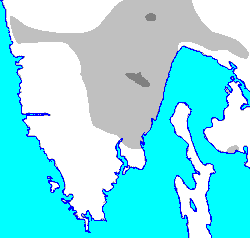Romanian, Istro
Facts
- Language: Romanian, Istro
- Alternate names: Istro-Romanian
- Language code: ruo
- Language family: Indo-European, Classical Indo-European, Italic, Latino-Faliscan, Latinic, Imperial Latin, Romance, Eastern Romance, Romanian, Northern Romanian
- Number of speakers: 555
- Vulnerability: Endangered [Read more...]
- Script: Latin script
More information:
Introduction
Istro-Romanian is an Eastern Romance language.

Istro-Romanian language is spoken on the Istrian Peninsula
Istro-Romanian is today spoken in a few villages in the peninsula of Istria, on the northern part of the Adriatic Sea, in what is now Croatia. Formerly it was spoken in a substantially broader part of northeastern Istria. Dark grey shows the current situation, the light grey shows areas, where Istroromanian was formerly spoken.
The remaining speakers of Itsro-Romanian call themselves Vlahi (a name given to them by Slavs), Rumeni, Rumêri or Rumâri, as well as Ćići and Ćiribiri (this last being a nickname that was used disparagingly for the Istro-Romanian language, not its speakers).
Conjugations
| Conjugation | I | II | III | IV |
| Infinitive | cl´amå | ramaré | båte | durmí |
- Other verbs of I conjugation: stå, turnå, zucå
- Other verbs of II conjugation: ve, tiré, be
- Other verbs of III conjugation: årde, pl'erde, zacl'ide
- Other verbs of IV conjugation: avzí, fi, cuperí
Other IV conjugation verbs formed with -éi and -úi: bivéi, movéi, piséi, frustikéi, carúi, radúi.
Verbs ending in -véi and -úi are iterative, whilst verbs ending -éi are either perfective or imperfective.
Nominal forms
| Conjugation | I | II | III | IV |
| Gerund | rugánda | tiránda | tragánda | avzínda copéinda |
Personal forms
Present
| Conjugation | I | II | III | IV |
| 1.sg. | ||||
| 3.sg. | ||||
| 1.pl. | rugån | tirén | mézen | avzín |
| 2.pl. | ||||
| 3.pl. | rógu | tíru | mégu | åvdu |
Imperfect
| Conjugation | I | II | III | IV |
| 1.sg. | rugåiam | cadéiam | trazéiam | avzíiam |
| 2.sg. | rugåiai | cadéiai | trazéiai | avzíiai |
| 3.sg. | rugåia | cadéia | trazéia | avzíia |
| 1.pl. | rugåian | cadéian | trazéian | avzíian |
| 2.pl. | rugåiat | cadéiat | trazéiat | avzíiat |
| 3.pl. | rugåia | cadéia | trazéia | avzíia |
Past Perfect
Past perfect is formed with the past participle and combined with auxiliary verb ve in present.
| 1.sg. | rugåt-am |
| 2.sg. | tirút-ai |
| 3.sg. | tras-a |
| 1.pl. | avzít-am |
| 2.pl. | verít-at |
| 3.pl. | copéit-a(v) |
Conjuctive present
is identical to the indicative present, but the conjunction se or neca preceeds it.
Conditional present
(res, rei, re, ren, ret, re) + rugå
Conditional perfect
(res, rei, re, ren, ret, re) + fost + rugå
Conditional future
| Conjugation | I | II | III | IV |
| 1.sg. | rugår | tirúr | trasér | avzír copéir |
| 2.sg. | rugåri | tirúri | traséri | avzíri copéiri |
| 3.sg. | rugåre | tirúre | trasére | avzíre copéire |
| 1.pl. | rugårno | tirúrno | trasérno | avzírno copéirno |
| 2.pl. | rugåret | tirúret | traséret | avzíret copéiret |
| 3.pl. | rugåru | tirúru | traséru | avzíru copéiru |
Verblist
- durmi
Notes
References
- Holtus, Günter et al.. Lexicon der Romanistischen Linguistik. Niemeyer. Tübingen, Germany, 1989.
- Richard Sârbu. Texte istroromâne. Timisoara, 1992.